Hinckley, Leicestershire
Up to 1834
A parliamentary report of 1777 recorded parish workhouses in operation in 'Hinkley' (for up to 90 inmates), Barwell (20), Burbage (2), and Earl Shilton (30). In the same year, John Howard noted that the Hinkley workhouse adjoined the local prsion and the poor 'looked healthy, were cheerful, clean, and at work.'
After 1834
Hinckley Poor Law Union officially came into existence on 9th February 1836. Its operation was overseen by an elected Board of Guardians, 25 in number, representing its 11 constituent parishes as listed below:
County of Leicester:
Aston Flamville, Barwell (3), Burbage (3), Earl Shilton (4), Elmesthorpe, Hinckley (5), Sapcote (2), Sharnford (2), Stoney Stanton (2).
County of Warwick:
Burton Hastings, Stretton Baskerville.
Later Additions: Higham on the Hill (from 1851), Stoke Golding (from 1851), Wigston Parva (from 1895).
The population falling within the Union at the 1831 census had been 13,780 with parishes ranging in size from Elmesthorpe (population 34) to Hinckley itself (6,491). The average annual poor-rate expenditure for the period 1833-5 had been £6,052 or 8s.9d. per head of the population.
Hinckley Union workhouse was built in 1838 on London Road in Hinckley and was designed by JA Hansom. The Poor Law Commissioners authorised an expenditure of £4,450 on construction of the building which was intended to accommodate 300 inmates. Its layout and location are shown on the 1901 OS map:
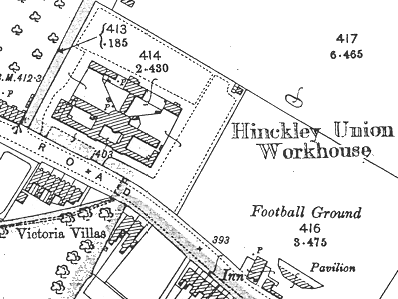
Hinckley workhouse site, 1901.
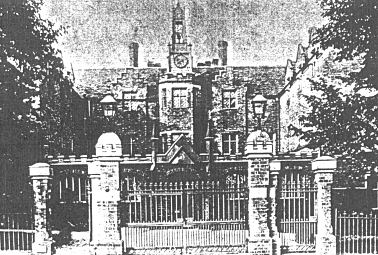
Hinckley workhouse, early 1900s.
In 1911-12, a new infirmary was erected at the north side of the workhouse and a new laundry and washhouse at the east.
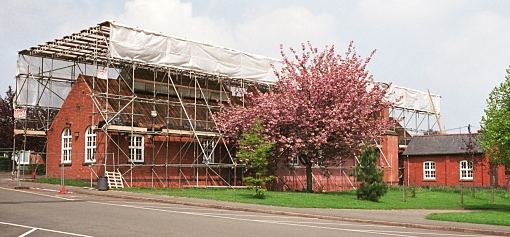
Hinckley laundry block from the south, 2004.
© Peter Higginbotham.
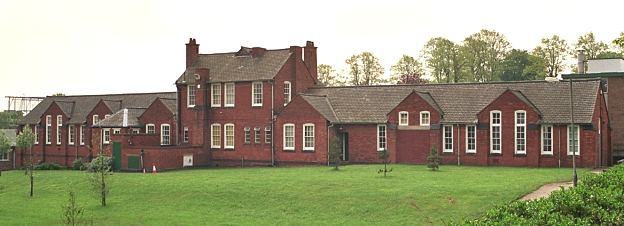
Hinckley infirmary from the north, 2004.
© Peter Higginbotham.
In common with other workhouses, Hinckley workhouse provided separate accommodation for the "casual poor" — mostly tramps and vagrants who were given one or two nights accommodation in return for performing a task of work, typically stone-breaking. From around 1870, to try and distinguish the honest unemployed from habitual vagrants, those judged to be in the former category were given "way-tickets" for a specified duration along a particular route. Way-tickets were issued by the local police or casual-ward superintendent, and would be endorsed at each workhouse visited. The ticket-holder would be entitled to favourable treatment, such as being exempt from work tasks or being allowed early release from the casual ward. In conjunction with waytickets, many casual wards also issued meal-tickets or bread-tickets which could be redeemed for food at a particular place en route. These were intended to try and ensure that casuals kept to their supposed destination, and also aimed to reduce begging.
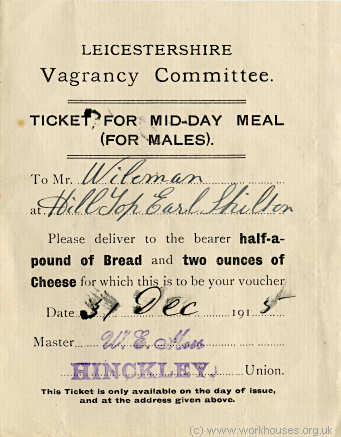
Bread ticket issued by Hinckley Union, 1915.
© Peter Higginbotham.
Most of the workhouse buildings are believed to have been demolished in around 1950 and only the former infirmary and laundry blocks survive. In recent times, the site has been occupied by the North Warwickshire and Hinckley College.
Beryl Bauld recalls: "I remember the old workhouse well. I lived in London Road, Hinckley during the war. American servicemen were billeted at the back of the workhouse and in Nissan huts all around the football field. The buildings were still there when I went to London to commence my nursing training in 1948. I also recall that the evacuees used to go to a clinic there for scabies!
Cottage Home
By the 1920s, the Hinckley Union had set up a cottage home at Burbage. Few details are known about the home but in 1924, it could accommodate 15 children who were in the charge of Miss E. Birch. The home appears to have closed by 1929.
Staff
Inmates
Records
Note: many repositories impose a closure period of up to 100 years for records identifying individuals. Before travelling a long distance, always check that the records you want to consult will be available.
- The Record Office for Leicestershire, Leicester and Rutland, Long Street, Wigston Magna, Leicester, LE18 2AH. Holdings include: Guardians' minutes (1842-1930); Admissions and discharges (1901-36); Births register (1916-36); Deaths (1914-36); etc.
Bibliography
- Howard, J (1777) The State of the Prisons
Links
- None.
Unless otherwise indicated, this page () is copyright Peter Higginbotham. Contents may not be reproduced without permission.


